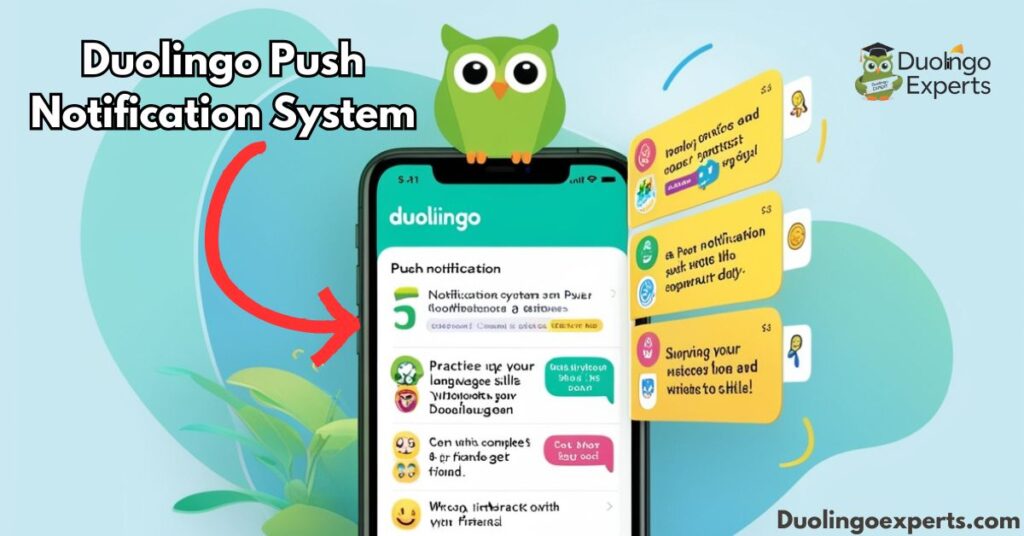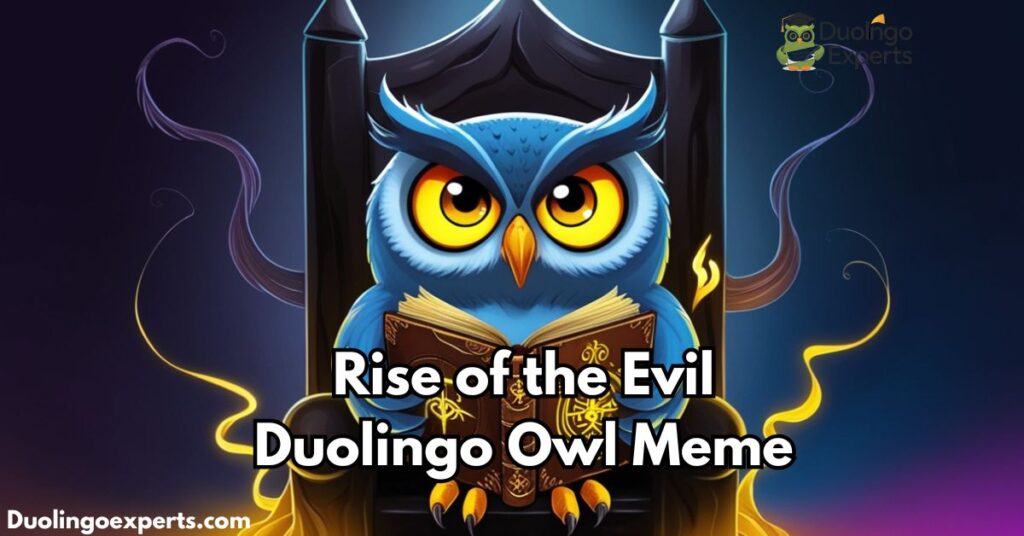Duolingo, the popular language learning app, has made a name for itself with its gamified approach to language education. Known for its friendly, approachable style and its signature mascot, Duo the owl, Duolingo is used by millions of people worldwide to learn new languages. However, a curious aspect of the app has gained attention in recent years: its push notifications. Specifically, users have been asking: Are Duolingo Owl Threats real, and is the Duolingo owl actually trying to intimidate you?
In this article, we’ll dive into the heart of this question by exploring the mechanics of Duolingo’s notification system, the psychological effects these alerts have on users, and the viral memes that have made the app’s push notifications a cultural phenomenon. We’ll also examine data privacy concerns, security breaches, and whether Duolingo is really as “threatening” as some of its internet fans make it out to be.
Duolingo Push Notification System: Strategy and Impact

What Are Push Notifications in Duolingo?
One of the most distinctive features of Duolingo is its frequent push notifications. These alerts are designed to keep users engaged and remind them to practice their language skills. Duolingo’s user engagement strategies revolve around encouraging consistent, daily learning to maintain a streak, motivating users to not break their learning routine.
While these reminders are intended to be helpful, many users have described them as passive-aggressive alerts, often perceived as a form of nagging. These notifications serve several purposes:
- Reminding users to practice: Notifications often say things like “You’re about to lose your streak!” or “Hurry, don’t forget to practice today!”
- Motivating users to stay consistent: Duolingo’s gamification approach rewards regular use, which keeps users coming back.
But these alerts don’t always come across as motivational—they can seem threatening, especially when users receive notifications that make them feel guilty for missing a day of practice.
How Duolingo Uses Push Notifications for Engagement
Duolingo has mastered gamified education by integrating notifications that push users to engage with the app consistently. This includes:
- Streak reminders: Users who don’t practice for a day or two will get frequent alerts warning them that they’re about to lose their progress.
- Personalized reminders: Duolingo tracks your habits and sends tailored reminders based on your learning progress and goals.
- Motivational nudges: Some users receive encouraging messages like, “Keep going, you’re doing great!”
While these tactics are rooted in behavioral psychology to promote user retention strategies, they have sparked mixed reactions. Some users appreciate the extra push, while others feel stressed and pressured.
The Psychological Effects of Duolingo Notification System
Motivation vs. Pressure
Duolingo’s notifications are designed to strike a balance between motivating users and pressuring them into completing their lessons. However, the latter is where the app falls into a psychological gray area.
- Positive Effects: For users who thrive on external motivation, the notifications can be a helpful tool. They encourage daily use, which is crucial for language fluency. Research on gamification suggests that rewards and reminders can enhance user engagement, especially when learners are pursuing long-term goals.
- Negative Effects: On the flip side, these frequent reminders can induce stress. Users who miss a day may feel guilty, or even experience a sense of pressure to catch up. This is particularly evident in Duolingo’s frequent notifications of looming streak losses.
Here’s an example of a typical notification users might receive:
- “You’re about to lose your streak! Don’t let it slip away!” While these alerts may seem playful, they can feel like threats, especially when users don’t have the time to complete a lesson.
The Rise of the “Evil Duolingo Owl” Meme

The Duolingo owl (aka Duo) has become an icon of internet meme culture. Over the years, the mascot has been featured in countless viral videos, TikTok marketing campaigns, and memes, often portrayed as a strict, even threatening, figure.
- Internet Culture: In memes, Duo is frequently depicted as a menacing figure, threatening users with phrases like, “If you don’t practice today, I’ll make you regret it!” or “I’m watching you.”
- The Humor Appeal: What began as humorous exaggeration has evolved into a running joke about the app’s “threatening” nature. The Evil Duolingo Owl memes now have their own life on platforms like TikTok, where users joke about the owl’s relentless pursuit of their attention.
These viral memes capture the exaggerated, humorous aspect of Duolingo’s notification system, but they also highlight a significant underlying concern: the pressure users may feel to stay engaged with the app.
Duolingo Data Privacy and Security Concerns
What Data Does Duolingo Collect?
Like many free apps, Duolingo collects user data to improve its services and offer personalized learning experiences. However, with growing concerns around data privacy and data security, it’s important to understand what exactly Duolingo collects:
- User Behavior: Duolingo tracks which lessons you complete, how long you spend on the app, and how frequently you use it.
- Personal Information: If you create an account, Duolingo may ask for personal details like your name, email, and location.
- Device Data: Duolingo also collects device-related information such as IP addresses, browser types, and operating systems.
This data is primarily used to personalize learning (e.g., adjusting difficulty levels) and to send targeted push notifications.
Third-Party Data Sharing Risks
Another point of concern is third-party data sharing. Duolingo partners with advertisers and other external services to improve its marketing efforts. While Duolingo’s terms of service claim to anonymize data, some users are wary of how their data may be used. Potential risks include:
- Ad targeting: User data may be shared with third parties for the purpose of delivering personalized ads.
- Security breaches: The more data is shared, the higher the likelihood of exposure in the case of a breach.
In 2023, Duolingo experienced a data breach involving the personal data of 2.6 million users. While Duolingo has since strengthened its security measures, this event raised alarms about the encryption and security of user data.
Are Duolingo “Threats” Real?

The Truth Behind the “Threatening” Notifications
So, does Duolingo actually threaten users? While the app’s notifications may seem ominous, they are ultimately designed to encourage learning, not to scare users into compliance.
However, the psychological effects of these reminders can’t be ignored. Some users may feel guilt or stress if they miss a lesson, while others appreciate the added pressure to stay on track. Humor in notifications plays a role here, as the app uses playful language to keep things lighthearted.
Ultimately, Duolingo’s notifications are not “real” threats. They’re part of a larger user engagement strategy designed to keep learners active and invested in their progress.
Duolingo Learning Effectiveness: Is It Helping Users Achieve Fluency?
How Well Does Duolingo Teach Languages?
Despite its engaging notification system, many users wonder: Is Duolingo truly effective for learning languages?
- Strengths: Duolingo’s gamified education is designed to make learning enjoyable. The app covers essential aspects of vocabulary and grammar and offers an interactive platform for practicing reading, writing, and listening skills.
- Weaknesses: While Duolingo is excellent for beginners and for building foundational knowledge, some users find it lacking in areas like spoken fluency and real-world conversations. Duolingo does not offer full language immersion methods, which many experts argue is essential for fluency.
A study by Independent Research on language learning effectiveness concluded that Duolingo is helpful for beginner-level learners but may not be enough to reach conversational fluency without additional resources, such as classes or language immersion.
Frequently Asked Questions
why does Duolingo threaten you?
Duolingo’s notifications may feel threatening due to their gamified pressure to maintain streaks and complete lessons, often using language that creates a sense of urgency or guilt. The Duolingo owl mascot’s portrayal in memes exaggerates this as a menacing figure for humor and internet culture.
Why is Duolingo sending me threats?
Duolingo sends notifications to encourage you to keep up with your language learning and maintain streaks, using reminders that can feel like threats. These messages are part of the app’s strategy to boost user engagement through gamification and personalized prompts.
What happens if you ignore Duolingo notifications?
If you ignore Duolingo notifications, you risk losing your streak and falling behind in your language lessons. Over time, this can decrease your engagement with the app and hinder your learning progress.
What is the Korean threat on Duolingo?
The “Korean threat” on Duolingo refers to a meme where users joke about the app’s aggressive reminder to complete lessons or risk losing their streak. It’s a playful exaggeration of Duolingo’s push notifications, particularly for learners of the Korean language course.
What are the Duolingo bird pronouns?
The Duolingo bird, known as Duo, uses the pronouns he/him in official Duolingo materials. However, Duo’s gender and persona are often portrayed humorously in memes, where it may be referred to with a variety of playful pronouns.
Why not to use Duolingo?
Some people avoid Duolingo due to its pressure-inducing notifications and over-reliance on gamification, which may feel overwhelming. Additionally, others feel that Duolingo’s learning methods might not be enough for achieving fluent language proficiency.
What happens if you delete Duolingo?
If you delete Duolingo, you’ll lose access to your lessons and progress unless you back up your account. Your learning streak and saved data might also be lost, though you can always reinstall the app and log back into your account.
How trusted is Duolingo?
Duolingo is generally considered trustworthy for language learning, with a large user base and positive reviews. However, concerns about data privacy and security incidents, like breaches, have raised some questions about how safely user information is handled.
What gender is Lin?
Lin, a character in Duolingo’s Chinese course, is depicted as female. The character’s gender is used in lessons to help teach vocabulary and grammar in context.
Does Duolingo sell your info?
Duolingo may share user data with third parties for advertising and analytics purposes, but it does not sell personal information directly. However, concerns about data privacy have been raised due to the app’s data-sharing practices.
Conclusion: The Owl’s Message Is It Real, or Just a Meme?
Duolingo’s notifications, along with its iconic Duolingo owl, have become cultural phenomena, sparking debates on their effectiveness and whether they can be considered “threatening.” While the push notifications can seem intimidating, they are simply part of Duolingo’s larger mission to keep users engaged and motivated.
As for data privacy and security concerns, Duolingo has made efforts to address issues, but with the rise of Duolingo Owl Threats, it’s important for users to stay informed about the data they share with the app. Finally, while Duolingo is a valuable tool for language learning, it’s not the complete solution for achieving full language fluency.
In the end, Duolingo’s notifications aren’t “threats”—they’re just part of a gamified education experience designed to keep you on track. Whether that’s motivating or pressure-inducing depends on your personal learning style.
>>>Read Also: Does Duolingo Have Latin? Learn Latin Effectively with This Complete Guide

DuolingoExperts, managed by MarkJohan, offers expert insights and tips for mastering languages. A tech-driven platform to enhance your learning experience.

